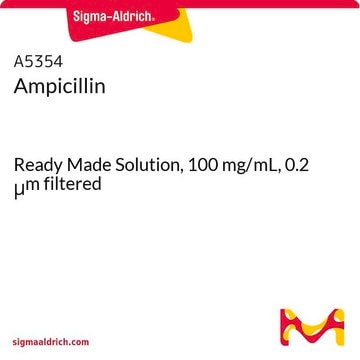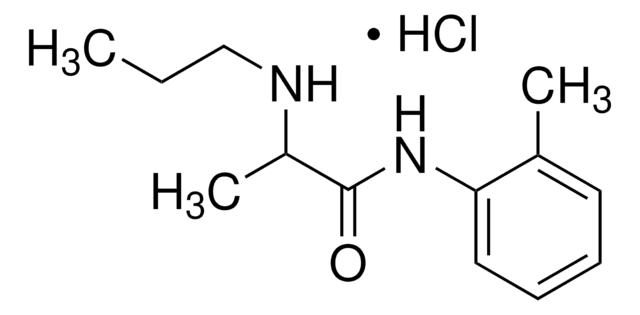1033203
USP
Ampicillin sodium
United States Pharmacopeia (USP) Reference Standard
Synonym(s):
Ampicillin sodium salt, D-(−)-α-Aminobenzylpenicillin sodium salt
About This Item
Recommended Products
grade
pharmaceutical primary standard
API family
ampicillin
manufacturer/tradename
USP
mp
215 °C (dec.) (lit.)
application(s)
pharmaceutical (small molecule)
format
neat
storage temp.
2-8°C
SMILES string
[Na+].CC1(C)SC2[C@H](NC(=O)[C@H](N)c3ccccc3)C(=O)N2[C@H]1C([O-])=O
InChI
1S/C16H19N3O4S.Na/c1-16(2)11(15(22)23)19-13(21)10(14(19)24-16)18-12(20)9(17)8-6-4-3-5-7-8;/h3-7,9-11,14H,17H2,1-2H3,(H,18,20)(H,22,23);/q;+1/p-1/t9-,10-,11+,14-;/m1./s1
InChI key
KLOHDWPABZXLGI-YWUHCJSESA-M
Looking for similar products? Visit Product Comparison Guide
General description
Biochem/physiol Actions
Mode of Resistance: Administration with ß-lactamase cleaves the ß-lactam ring of Ampicillin and inactivates it.
Antimicrobial Spectrum: Includes both gram-positive (similar to benzylpenicillin) and gram-negative bacteria (similar to tetracyclines and chloramphenicol.
Analysis Note
Other Notes
related product
Signal Word
Danger
Hazard Statements
Precautionary Statements
Hazard Classifications
Resp. Sens. 1 - Skin Sens. 1
Storage Class Code
11 - Combustible Solids
WGK
WGK 2
Flash Point(F)
Not applicable
Flash Point(C)
Not applicable
Regulatory Listings
Regulatory Listings are mainly provided for chemical products. Only limited information can be provided here for non-chemical products. No entry means none of the components are listed. It is the user’s obligation to ensure the safe and legal use of the product.
JAN Code
1033203-125MG:
Choose from one of the most recent versions:
Certificates of Analysis (COA)
Sorry, we don't have COAs for this product available online at this time.
If you need assistance, please contact Customer Support.
Already Own This Product?
Find documentation for the products that you have recently purchased in the Document Library.
Customers Also Viewed
Our team of scientists has experience in all areas of research including Life Science, Material Science, Chemical Synthesis, Chromatography, Analytical and many others.
Contact Technical Service




